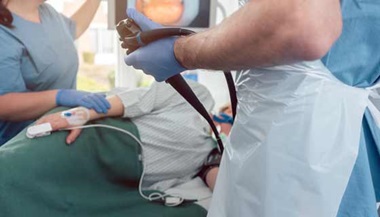Gastroparesis Treatment
An accurate diagnosis is necessary to treating gastroparesis, since the treatment depends on the cause. If your doctor diagnosed an underlying disease or condition that is causing the gastroparesis, the treatment will focus on correcting or reversing that condition; if there is no underlying cause or if it is not possible to treat it, then the goal of treatment is to promote gastric emptying and relieve your symptoms.
The first step is to stop taking medications that inhibit or delay gastric emptying.
Gastroparesis treatment options include:
Dietary changes
Medication
Endoscopic therapy
Experimental therapies
Dietary Changes
Many patients who suffer from gastroparesis are not absorbing enough nutrition. Dietary changes can relieve symptoms while maintaining proper nutrition. Dietary modifications include:
- Switching to a liquid diet, as liquids may empty more easily from the stomach
- Eating several small meals throughout the day rather than two or three large meals
- Avoiding late night eating
- Eating foods that are lower in fiber and fat; both fiber and fat can cause a delay in gastric emptying
- Avoiding hyperglycemia (high blood sugar), which can delay gastric emptying
- Pureeing food can sometimes make it easier for the stomach to digest
- Avoiding narcotic medications
- Stopping smoking
A trained nutritionist can help you manage your diet.
Medication
There are a number of medications available to treat gastroparesis. Your doctor will discuss with you the benefits and risks of each one before deciding on a medication regimen.
Prokinetic Medications
Prokinetic medications are drugs that promote gastric emptying and are an important part of managing gastroparesis. Two commonly used medications are:
- Erythromycin: This medicine induces forceful contractions, stimulating gastric emptying of both solid and liquid foods. You can take this medicine orally or receive it intravenously. Erythromycin may cause abdominal cramps and nausea.
- Metoclopramide: This medicine increases the movements in your digestive system, helping the food to pass through more quickly and efficiently. This is the only medication in the United States that is FDA approved to treat gastroparesis. However, in some patients it may cause movement disorders. Your doctor will discuss with you if you are a candidate for this medication.
Anti-Emetic Therapy
Occasionally, prokinetic medication does not offer substantial relief from the nausea and vomiting associated with gastroparesis. Your doctor may prescribe antiemetic therapy to help with those symptoms. Antiemetic drugs are also known as anti-sickness drugs.
Endoscopic Therapy
If dietary changes and medication did not improve your symptoms, your doctor may perform an endoscopic procedure.
- Decompressive gastrostomy: During an endoscopy, your doctor places a gastrostomy tube into your stomach. The tube helps drain the stomach, improving the nausea and vomiting.
- Jejunostomy: If the gastrostomy tube is not effective, a jejunostomy tube will be left in place to ensure you remain properly hydrated and nourished. During a jejunostomy, a feeding tube is inserted through your abdomen and into your small intestine. This way, your small intestine receives the nutrients directly, bypassing the stomach.
Experimental Therapies
Doctors at Johns Hopkins are at the forefront of novel therapies for patients with gastroparesis. In fact, we are the only health care center in Maryland to offer gastric pacing, a new approach to treating gastroparesis.
Gastric Pacing
Gastric pacing is also known as gastric electric stimulation.
During gastric pacing:
- You undergo a small operation to place electrodes on the surface of the stomach called the gastric serosa, the membrane lining of the stomach.
- The electrodes provide electric stimulation.
- The stimulation increases muscle contractions and improves gastric emptying.
Gastric pacing has been shown to decrease nausea in some patients; however, data is still emerging and not all patients benefit. Talk to your Johns Hopkins gastroenterologist to see if gastric pacing is right for you.
Botulinum Toxin (Botox®)
In some patients with gastroparesis, spasms of the lower stomach may contribute to abnormal gastric emptying. The contraction and relaxation functions of the stomach are uncoordinated and ineffective. Botulinum toxin is a medicine that your doctor injects into your stomach muscle to prevent muscle contraction. It can help improve spasms in the stomach muscles.
Some studies show that the medicine decreases resistance in the muscles and improves gastric emptying and symptoms. Other studies showed that this treatment did not routinely benefit patients with gastroparesis. Therefore, this medicine may be used for select patients with signs of lower stomach spasms, but it is not used routinely.
Novel Therapies
Research is continuing into certain medications and procedures that may be effective for treating gastroparesis. These include medications to affect the movement of the stomach muscles and to improve gastric emptying. Other nonmedical therapies which are sometimes offered to patients include gastric outlet stenting (placing a stent in the pylorus and holding it open for food to pass through), gastric outlet myotomy (cutting the muscle of the pylorus to enable food to pass through) and in some rare cases, total gastrectomy (surgical removal of the stomach). In these difficult cases where standard medical therapies do not help, Johns Hopkins physicians work together in teams to create new and innovative therapies.
Alternative Therapies
There is anecdotal data to support use of alternative therapies like ginger, herbal therapies, magnetic anti-nausea bracelets and acupuncture. While data is limited, it appears that many patients may benefit from these interventions. Hopkins offers our patients alternative therapies, and we have two trained acupuncturists on staff at the integrative medicine center.




